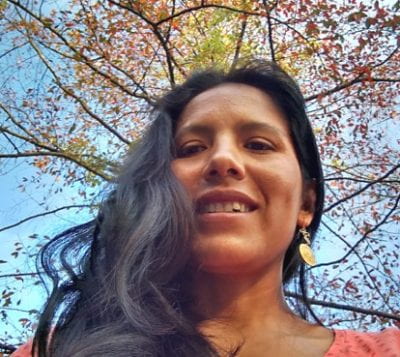|
Location: Kelly Writers House
2:00 PM – 4:00 PM: Speak the Language of your grandmother! Please sign up for a 5-minute slot to speak/read the language of your ancestry or share with us a word/expression that you would recall as a valuable memory to you. We want to record as many languages as possible from across the world, especially languages indigenous to the Americas. Open studio time. Location: Kelly Writers House
Sign up sheet for a 5-minute time slot
4:00-5:00pm Explore Khipus and numbers with the Quechua class. Location: Penn Museum Attendees will be able to interact with Andean Khipus from the Penn Museum’s collection. It will be a great opportunity since these artifacts are currently not on public display. RSVP here
6:00 PM – 7:15 PM:
Quechua Writers: Pablo Landeo-Muñoz and Irma Alvarez-Ccosco, a reading and conversation. Register here

Pablo Landeo-Muñoz is a Peruvian award-winning writer, translator, and teacher of language and literature. He is currently a Quechua professor at INALCO in Paris, and director of the literary magazine Atuqpa Chupan (“The fox’s tail” in Quechua), which is published annually and written entirely in Quechua. In 2011, his collection of poems Los hijos de Babel appeared in Spanish. He published a collection of stories from Huancavelica in Quechua Ayacucho under the title Wankawillkain 2013, complemented by translations into Spanish and a study in Quechua. His novel Aqupampa won 2018 Peru’s National Prize of Literature in the category of Indigenous Languages.

Irma Alvarez-Ccoscco is a Quechua poet and language activist from Haquira, in Peru’s Apurímac region. She is a former fellow of the Artist Leadership Program at Smithsonian’s National Museum of the American Indian. In 2018 she presented her first short-film Runasimpi Qillqaspa, about the efforts to promote literacy among Quechua native speakers in the Andes. Additionally, she has been involved in projects about the use of Quechua language in radio, software, and programmers in Peru and the United States.
7:15 PM – 8:00 PM: Reception
- Wednesday, October 30th
Location: Kelly Writers House
12:00 – 1:30 PM: Lunch rountable: What does it mean to reclaim a language? Participants: Stephanie Mach (Diné/Navajo), Janice Llamoca (Quechua), Moderator: Connor Beard (Lumbee Tribe) . Sign up here
6:00-6:15pm PM: Nahuatl poetry and Aztec dances at Kelly Writers House
6:15 – 7:40 PM: Zapotec short-films: Dizhsa Nabani — Lengua Viva — Living Language, screening and discussions.
Presented by Felipe H. Lopez, Brook Lilehaugen, Eddie Oggborn, Sabea Evans, and Kathryn Goldberg. RSVP here

Dizhsa Nabani is a documentary film series, supported by DocuLab at Haverford College. They explore the relationship between Zapotec identity, language, and daily life. The series traces efforts of San Jerónimo Tlacochahuaya (México) community members, including farmers, artesans, and public officials, to sustain and re-invigorate their Zapotec language.
- Thursday, October 31st
Location: Kelly Writers House
11:30am-1pm: Informal Lunch with Pablo Landeo-Muñoz Informal Lunch with Pablo Landeo-Muñoz, Quechua writer and Peru’s National Literature Prize winner. Moderator: Marco Avilés.
Sign up, here
|